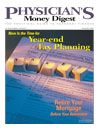Listen to a Seasoned Physician-investor
What experiences as both aphysician and an investor led youto write this book?
The specific event was the followingtrue story. A group of physicians wereapproached by a non-US citizen regardinga South American investment.The physicians put up some cash andsigned notes. The deal fell apart, andeach physician lost between $3 millionand $10 million. When one of thephysicians was asked why he had participated,he said that if in 5 years hewas still slaving away while his partnersretired in luxury, he would kickhimself. To be quite truthful, the problemwas greed. If I can help just onephysician avoid such a financial disaster,this book is worthwhile.
Can you relay some of your earlyinvesting successes and failures?
The greatest investment I ever madewas in my own education. I havereaped gains far greater than I dreamedpossible. Because a physician's greatestasset is their ability to earn a goodincome, good disability insurance is essentialto have.
My two greatest investment failureswere led by ego and lack of good judgment.The first involved a collectiblethat I had no business buying. The purchasewas driven by ego and backed bya terrible lack of knowledge. I blame noone but myself for that debacle. Withthe second failure, I participated in aninvestment despite my great reservations,but I allowed someone to talk meinto it because others were participating.From this experience, I learned totrust my own judgment and not toinvest just because others do.
No doubt that your fellowphysicians can understand the effectsof greed on investing. Canyou explain how ego and greedcan get in the way of choosing asuccessful investment?
Greed is human nature, and nobodycan immunize themselves against itsdestructive power. I do have one suggestion:Equate greed with the word"rich." Whenever you are thinking ofbeing "rich," an alarm should go offthat greed has reared its ugly head.Being rich should not be your goal, butfinancial security should. Your bestchance for avoiding greed is to replace"rich" with "financial security" inyour vocabulary.
Ego and glamour go hand-in-hand.The goal of any investment is to makemoney, not to impress others. I wouldmuch rather have a sheep farm thatreturns 15% a year and allows me todouble my money in 5 years than aglamorous investment such as the nextpossible Kentucky Derby winner.
In your book, you also advisethat the most important aspect ofaccumulating wealth is thrift. Areyou advising physicians to avoidthe social pressure of exhibitingwealth that is associated withbeing a doctor?
If a physician feels they must showoff so others think they are rich orwealthy then they deserve whateverbefalls them. I prefer to impress peoplewith my character, achievements, andcharitable donations, rather than myclothes, car, or home. If a physiciancan say, "This is too expensive, I cannotafford this," then they have takenthe first steps down the road to financialsecurity.
With so many physicians todayin debt and even facing bankruptcy,what are some strategies for avoidingdebt and paying it off?
This is easier than it sounds. Debt isspending money that you do not have.The fact that you must borrow moneyshould be a red flag that you cannotafford what you wish to purchase. Ifyou really wish to avoid debt problems,pledge to yourself that you willnot borrow any money except for youreducation and your home. If you neverborrow to make an investment or topurchase a depreciating asset, such as acar or boat, you should not have toworry about excessive debt or thethreat of bankruptcy.
You also state that you wish toinstill a sense of "healthy skepticism" in physicians, despite theirtraining to implicitly trust theirpatients. How can physicians learnto distinguish between the differenttypes of trusts necessary to besuccessful in the medical worldand in the financial world?
There are no different types oftrust. Trust is trust. We trust our patients,but a physician is wise to beskeptical when a patient assures usthat they do not consume alcohol yethave a blood alcohol level of 0.12, orthey say they are really watching theirdiet but their weight is up 18 poundssince the last office visit.
In the financial and legal world,another way to think of trust would beto remember the term "due diligence." This is essentially the process of independentlychecking for yourself everythingthat you are told, and to do yourown research. If what you are told is nottrue, do not give this person your trust.
If knowledge equals money, howdo physicians invest in the areasthey understand?
I would start by saying do notinvest in what you don't know. If youdon't understand something, don't doit. It is just that simple. I received a callearlier this week about investing infuel cells. It took me less time thanstating this sentence to know that thisinvestment was not for me.
Also, equate what you know withwhat you like. Find an area that youfind fun and learn as much as possibleabout that area—the stock market,local real estate, or a particular area ofcollectibles. If you try to force somethingjust because you think it may beprofitable, it will not be fun and it willnot be profitable.
What is the most importantfinancial lesson you have learnedas a physician-investor?
Avoid as much as possible theadvice of experts, read and study, trustyour own judgment, and make yourown investment decisions.
